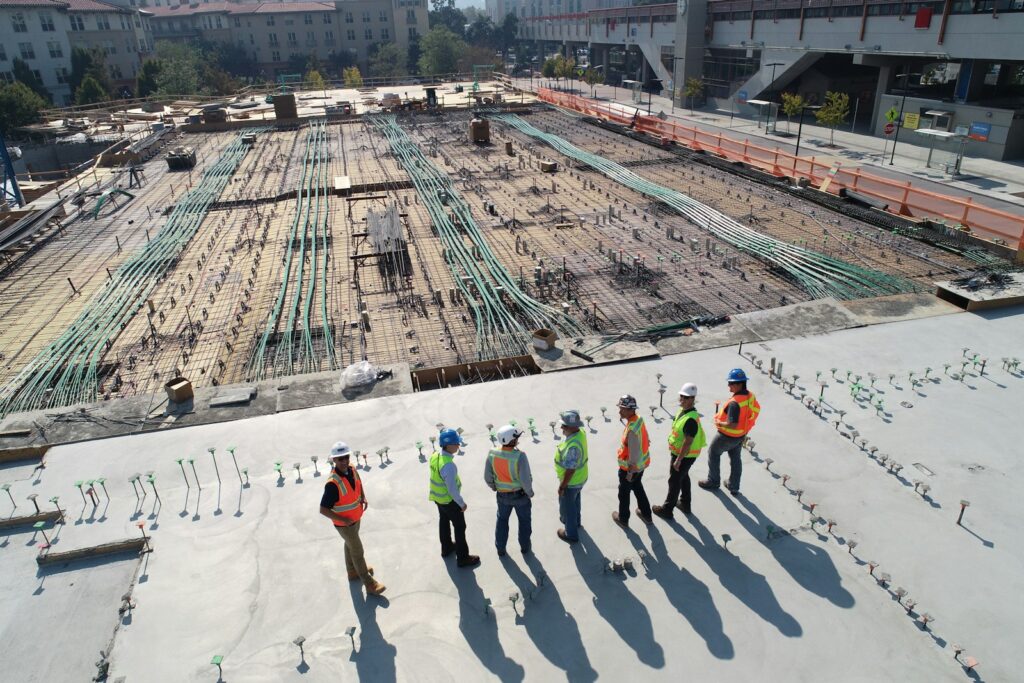Wondering what does a civil engineer do?
Civil engineers play an integral role in shaping the environment we live in, ensuring that cities and towns are equipped with the infrastructure we need to thrive. For property and real estate developers, understanding the civil engineering field is essential in creating successful and sustainable projects. But what exactly does a civil engineer do, and why is their work so crucial?
This blog unpacks the diverse responsibilities of civil engineers, the skills they bring to the table, and how South Coast Improvement Company leverages civil engineering expertise to deliver outstanding results. Whether you’re working on residential buildings, commercial complexes, or large-scale infrastructure, this guide is built to inform and inspire.
What is Civil Engineering?
Civil engineering is one of the oldest engineering disciplines, dealing with the planning, design, construction, and maintenance of infrastructure projects. From roads and bridges to water systems and buildings, civil engineers apply scientific principles to create solutions for real-world challenges.
State and local governments are significant employers of civil engineers, accounting for a notable portion of the workforce.
This discipline is as varied as it is essential. Civil engineers work on:
-
Designing safe, functional structures
-
Maintaining and improving existing infrastructure
-
Solving environmental issues, such as waste management and erosion control
In the modern era, these professionals also use technologies like computer-aided design (CAD) software for accurate planning and simulation, ensuring projects meet safety standards and client expectations.

What Does a Civil Engineer Do? | Types of Civil Engineers
Civil engineering is a broad field encompassing several specializations. Here’s a closer look at the main types of civil engineers and their unique functions:
Structural Engineers
These engineers focus on designing buildings and structures that can withstand external forces such as gravity, earthquakes, wind, and snow.
Geotechnical Engineers
Specializing in earth materials, geotechnical engineers study and design foundations, tunnels, and other underground infrastructure to ensure stability and safety.
Transportation Engineers
From highways to public transport systems, transportation engineers plan and develop systems to improve traffic flow, minimize congestion, and maximize safety.
Environmental Engineers
This branch combines civil engineering with environmental science. Environmental engineers focus on sustainable solutions, such as green buildings, renewable energy projects, and water and sewage systems.
Water Resource Engineers
These professionals deal with hydraulic systems and water management, playing a crucial role in designing systems like dams, canals, and stormwater management solutions.
Construction Managers
Some civil engineers specialize in construction management, overseeing projects from start to finish to ensure they are completed on time, within budget, and to the highest safety standards.
At South Coast Improvement Company, we bring together expertise across these specializations. Whether it’s structural design or sustainable infrastructure, our multifaceted team has you covered.
What Do Civil Engineers Work On?
Civil engineers collaborate with architects, contractors, and other engineers to execute a variety of projects effectively. Below are notable examples:
- Construction Projects: Civil engineers design and oversee the construction of buildings and other structures, working closely with developers to meet design specifications and safety regulations.
- Infrastructure Projects: Roads, bridges, and sewage systems all fall under the civil engineering umbrella. These projects are vital for maintaining public safety and improving overall quality of life.
- Environmental Projects: Civil engineers help address environmental concerns by designing solutions for waste management, water treatment, and renewable energy systems.
Civil engineers typically split their time between office settings (design and planning) and construction sites, ensuring projects align with safety standards and client requirements.
Essential Skills for Civil Engineers
Civil engineering is a demanding profession that requires a unique set of skills, including:
-
Problem-Solving: Civil engineers must address practical challenges in their projects, from structural concerns to environmental impact.
-
Project Management: Since most civil engineering projects are large in scale, effective project management—including strategic planning and resource allocation—is critical.
-
Technical Expertise: From CAD software to advanced simulations, civil engineers rely heavily on technology and a strong foundation in mathematical and scientific principles.
-
Communication: Engineers must convey complex technical details to non-technical stakeholders, ensuring that everyone involved in a project remains informed and aligned.
Occupational Requirements
How to Become a Civil Engineer
The path to becoming a civil engineer involves education, licensing, and practical experience. Here’s how most professionals enter the field:
-
Education: Earning a bachelor’s degree in civil engineering or a related field is the first step. Accredited programs provide a solid foundation in math, science, and engineering principles.
-
Licensing: Most civil engineers pursue a Professional Engineer (PE) license, which demonstrates their competence and is required for certain positions.
-
Continuing Education: Staying up to date on the latest civil engineering technology and techniques is essential in this fast-evolving field. Engineers often participate in training and certification programs throughout their careers.
South Coast Improvement Company works exclusively with highly qualified and licensed professionals, ensuring your infrastructure projects are supervised by experts at every stage.

Entry-Level Civil Engineers
Entry-level civil engineers typically begin their careers as junior engineers or engineering technicians, working under the guidance of seasoned professionals. Their responsibilities may include assisting in the design and development of civil engineering projects, conducting site inspections, and monitoring construction progress.
These early-career engineers also prepare reports and presentations, and may help develop project proposals and bids. As they gain experience and hone their skills, they can take on more significant responsibilities, eventually moving into senior roles such as project manager or lead engineer.
The Role of Civil Engineers in Project Management
One of the most critical aspects of a civil engineer’s work is project management. Civil engineers are responsible for:
-
Scheduling and Budgeting: Creating realistic project schedules and budgets to ensure timely delivery without overruns.
-
Risk Management: Anticipating potential issues and developing strategies to mitigate risks.
-
Stakeholder Communication: Collaborating with architects, contractors, and local governments to align on project goals and specifications.
At South Coast Improvement Company, our Design-Build Service Package simplifies this process by offering a single-source model for design and construction, streamlining projects and ensuring client satisfaction.
Industry Outlook and Demand for Civil Engineers
The Bureau of Labor Statistics projects a 6% growth in civil engineering employment from 2023 to 2033, fueled by the increasing demand for improved infrastructure due to population growth. Civil engineers earn a median annual wage of around $95,000, making it a lucrative and stable career choice.
For property developers and real estate professionals, the expertise of civil engineers is invaluable in adapting to infrastructure needs and delivering cutting-edge projects.
Why Civil Engineering Matters
Civil engineers play a crucial role in shaping the infrastructure that powers economic development and improves quality of life. Through collaboration, expertise, and commitment to innovation, these professionals help design and build environments that stand the test of time.
At South Coast Improvement Company, we understand the complexities of civil engineering and provide solutions tailored to your needs. From drafting projects to on-site management and quality control, we’re here to ensure your vision becomes a reality.

Take the First Step Towards Seamless Development
Civil engineering may seem daunting, but with the right partner, it doesn’t have to be. South Coast Improvement Company brings decades of experience in construction and civil engineering, coupled with our industry-leading Design-Build Service Package.
Transform your ideas into success stories. Contact South Coast Improvement Company today to learn more about how we can help with your next project or request a customized consultation to discuss your construction and engineering needs.
Learn More About Civil Engineering
Deepen your understanding of civil engineering and its impact on the world by exploring these credible resources:
-
American Society of Civil Engineers (ASCE): Discover the latest in civil engineering advancements, standards, and professional development opportunities.
-
National Society of Professional Engineers (NSPE): Learn about the ethical and professional responsibilities of engineers, along with career resources.
-
Engineering News-Record (ENR): Stay informed with news, insights, and analysis on the construction and civil engineering industries globally.
-
Civil Engineering Magazine: Access articles on cutting-edge projects, technologies, and trends shaping the profession.
-
U.S. Bureau of Labor Statistics – Civil Engineers: Gain insights into career prospects, job roles, and industry statistics for civil engineers.
-
Structurae: Explore an international database of structures and construction engineering with project details, photographs, and technical insights.
-
American Concrete Institute (ACI): Discover resources on the latest standards, technologies, and educational materials related to concrete design and construction.
-
CivilDigital: Access a wide range of resources, including presentations, e-books, and research articles for civil engineering professionals.
-
ICE Virtual Library: Browse journals, e-books, and conference papers from the Institution of Civil Engineers for in-depth knowledge and research.
These resources provide valuable knowledge to enthusiasts, students, and professionals looking to explore or advance in the field of civil engineering.
View Our Work
Aspen Dental
Partnering with The Aspen Group on the construction of a new Aspen Dental facility that’s functional & welcoming for patients & staff alike. South Coast Improvement Company was awarded the construction of a new Aspen Dental facility in Killingly, CT. The...
Springhouse Senior Living – HumanGood
Designed to enhance comfort & functionality. South Coast Improvement company was hired by HumanGood for an interior and exterior renovation at Springhouse Senior Living. Our skilled teamtransformed the 2nd through 5th floor common areas into brighter, more...






